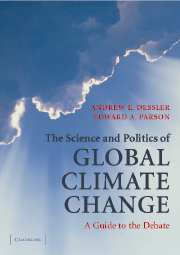Book contents
- Frontmatter
- Contents
- Preface
- 1 Global climate change: a new type of environmental problem
- 2 Science, politics, and science in politics
- 3 Climate change: present scientific knowledge and uncertainties
- 4 The climate-change policy debate: impacts and potential responses
- 5 The present impasse and steps forward
- Appendix
- Glossary
- References
- Index
Preface
- Frontmatter
- Contents
- Preface
- 1 Global climate change: a new type of environmental problem
- 2 Science, politics, and science in politics
- 3 Climate change: present scientific knowledge and uncertainties
- 4 The climate-change policy debate: impacts and potential responses
- 5 The present impasse and steps forward
- Appendix
- Glossary
- References
- Index
Summary
The Kyoto Protocol, the first international treaty to limit human contributions to global climate change, entered into force in February 2005. With this milestone, binding obligations to reduce the greenhouse-gas emissions that are contributing to global climate change came into effect for many of the world's industrial countries.
This event has also deepened pre-existing divisions among the world's nations that have been growing for nearly a decade. The most prominent division is between the majority of rich industrialized countries, led by the European Union and Japan, which have joined the Protocol, and the United States (joined only by Australia among the rich industrialized nations), which has rejected the Protocol as well as other proposals for near-term measures to limit greenhouse-gas emissions. Even among the nations that have joined Kyoto, there is great variation in the seriousness and timeliness of the emission-limiting measures they have adopted, and consequently in their likelihood of achieving the required reductions.
There is also a large division between the industrialized and the developing countries. The Kyoto Protocol only requires emission cuts by industrialized countries. Neither the Protocol nor the Framework Convention on Climate Change, an earlier treaty, provides any specific obligations for developing countries to limit their emissions. This has emerged as one of the sharpest points of controversy over the Protocol – a controversy that is particularly acute since the Protocol only controls industrialized-country emissions for the five-year period 2008–2012.
- Type
- Chapter
- Information
- The Science and Politics of Global Climate ChangeA Guide to the Debate, pp. vii - xPublisher: Cambridge University PressPrint publication year: 2005



